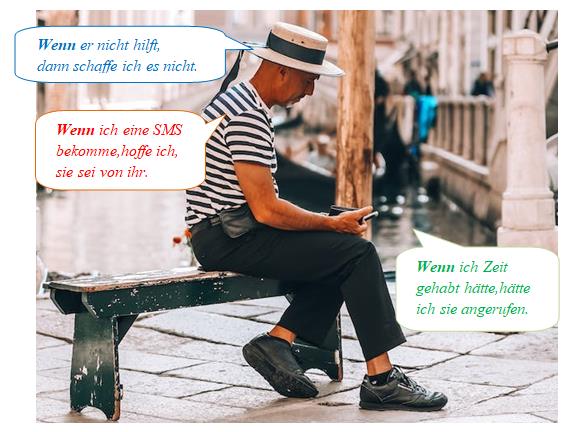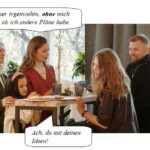In this lesson you will learn all about conditional sentences, wenn and falls conjunctions. What do they mean and how are they used, how do they function, which relationships prevail in conditional sentences, which tenses can we use. Instead of conditional sentences, we will call them wenn and falls sentences, because they are easier to remember.
Thank you for reading this post, don't forget to subscribe!CONTENTS
What are conditional sentences?
wenn
Real and unreal conditional sentences
falls
sofern
Word Order
What are conditional sentences?
A conditional, that is, a conditional sentence is a dependent sentence that expresses a condition. The condition is described in the dependent clause, and the consequence in the main clause. If the condition is fulfilled in the dependent clause, then the action in the main clause can be fulfilled, whatever that may be.
For example:
Wenn ich Zeit habe, fahre ich Rad.
The condition is that I have time, then I can ride a bike. We can also add dann.
For example:
Wenn ich Zeit habe, (dann) fahre ich Rad.
Dann is optional, if we decide to use it, then it must come after the comma in the first place, followed by the verb in the person. Conjunctions used in conditional sentences are: wenn, falls, sofern.
Click on:
Grammar Contents
Wenn
“Wenn” is a conjunction commonly used in conditional sentences as well as in time/temporal sentences. In conditional sentences, “wenn” means “if,” and in temporal sentences, it means “when.” It’s important to note that “wenn” sentences are dependent clauses, so the old rule applies: all verbs are placed at the end of the sentence.
For example:
Ich trinke Kaffee, wenn ich Kopfschmerzen habe.
In this case, the main sentence can precede the dependent one, but the dependent one can also precede the main one.
For example:
Wenn ich Kopfschmerzen habe, trinke ich Kaffee.
The verb comes into the first position when the main clause is BEHIND the dependent clause. In a dependent clause, the order is always the same.
Real and unreal conditional sentences
Conditional sentences with the conjunction wenn can be used in the indicative and they are then real conditional sentences, examples are listed above, but they can also be used in the subjunctive II and then they are unreal conditional sentences.
Unreal conditional sentences
Conditional sentences referring to the present and the past are often unreal, therefore, we use the subjunctive II.
For example:
Wenn es heute sonnig wäre, gehen wir spazieren. – If it were sunny today, we’d go for a walk.
Wenn es sonnig gewesen wäre, wären wir spazierengegangen. – If it had been sunny, we would have gone for a walk.
Conditional sentences referring to the future can be real or unreal. Here is the indicative used before the subjunctive II.
However, nowadays the indicative is mostly used, which is certainly much easier for those learning German.
For example:
Wenn es am Wochenende sonnig ist, gehen wir spazieren.
Falls
Pored wenn postoje još dva veznika, jedan od njih je falls. Falls ima isto značenje kao i wenn.
Postoji sitna razlika između falls i wenn. Pomoću falls se može izraziti smanjena verovatnoća da će se nešto desiti, ispuniti. Ali, čak i u govornom nemačkom jeziku ta se razlika gotovo izgubila.
Besides “wenn”, there are two other conjunctions, one of them is “falls”. Falls has the same meaning as wenn.
For example:
Ich werde morgen fahren, falls ich Flugticket bekomme. – I’ll go tomorrow if I can get a plane ticket.
A dependent clause can precede the main one. This is the more common variant with this conjunction.
For example:
Falls ich Flugticket bekomme, werde ich morgen fahren.
Click on:
Grammar Contents
Sofern
“Sofern” is a variant of the conjunction “wenn” which means “if” in English. It is used mainly in formal or elevated speech and is not commonly used in everyday conversation. The rules for using “sofern” are the same as for “wenn” and “falls”. It is a dependent conjunction, so the verbs must be placed at the end of the sentence. The dependent clause can come before or after the main clause.
For example:
Sofern es morgen sonnig ist, gehen wir spazieren. – If it’s sunny tomorrow, we’ll go for a walk.
Die Fahrt dauert drei Stunden, sofern es an der Grenze nicht zu Verzögerungen kommt. – The journey takes three hours, provided there are no delays at the border.
Word order

See more:



